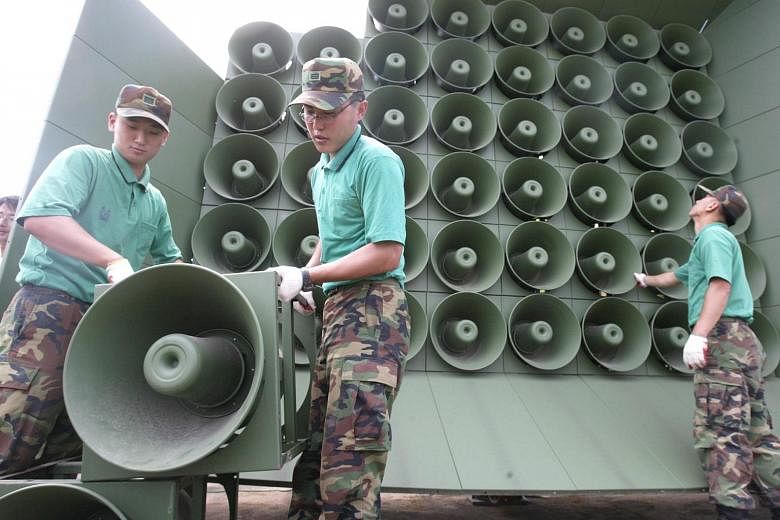SEOUL (AFP) - South Korea switched off loudspeakers blasting propaganda messages into North Korea after the two rivals reached a compromise deal on Tuesday and stepped back from the brink of an armed clash.
The giant banks of speakers, which had lain silent for more than a decade, were drafted back into action two weeks ago after Seoul blamed Pyongyang for landmine blasts that maimed two patrolling South Korean soldiers.
The South demanded an apology, while the North denied any involvement and threatened to attack the propaganda units as cross-border military tensions soared.
With the situation pushed to the brink of conflict, the two sides secured an agreement on Tuesday morning on ending the crisis after more than 40 hours of intense day-night negotiations.
North Korea "expressed regret" for the mine blasts and the South turned off the loudspeakers at mid-day on Tuesday (11.00 am Singapore time).
South Korea's defence ministry said troops would remain on high alert until it confirmed that the North had stepped down from a "semi-war state" ordered by leader Kim Jong Un.
"Our side stopped the broadcasts, but we are maintaining our alert posture while we monitor the movement of North Korean troops," a ministry spokesman said.
"It will take time for them to pull back."
The crisis had seen a rapid escalation in military movements, with South Korean and US fighter jets flying simulated bombing sorties and North Korea reportedly deploying dozens of submarines and doubling artillery units at the border.
The United States, which has close to 30,000 troops permanently stationed in South Korea, welcomed the decision to de-escalate.
"It was a very tense several days," US State Department spokesman John Kirby told a regular briefing.
"Now we're going to have to see how it plays out," Kirby added.
The final wording of the communique fell short of the complete apology South Korea had sought for the mine blasts, and there was no explicit acceptance of responsibility by Pyongyang, which has repeatedly denied any role in the incident.
But South Korea's lead negotiator, National Security Adviser Kim Kwan Jin, insisted the expression of regret was "very meaningful" and said securing it had been the toughest part of the negotiating process.
- 'Word of apology' -
"We had to get a word of apology that has the North as the main agent," Kim said.
The two sides also agreed to work towards a resumption next month of reunions for families separated by the 1950-53 Korean War, and to hold official talks in either Seoul or Pyongyang at a date to be decided.
Analyst reaction was mixed, with some suggesting the South had come away with too little in terms of a clear apology.
Seoul had also sought a specific promise from Pyongyang to refrain from future provocations, but had to settle for a vague reference to avoiding "abnormal" events.
But Jeung Young-Tae, an analyst at the Korea Institute for National Unification in Seoul, argued that the expression of regret had been stronger than many expected.
"In the world of diplomatic language, this is a clear apology, with the object of the regret - the landmine blasts that maimed the soldiers - clearly stated," Jeung said.
It remains to be seen how far the agreement takes the two Koreas, beyond ending the current stand-off.
Previous agreements that appeared to offer a new way forward for relations have generally stumbled straight out of the gate.
In October last year, the two sides agreed to a resumption of high-level talks, but the dialogue never materialised due to a row over South Korean activists floating anti-Pyongyang leaflets over the border by balloon.
The leafleting is sure to continue, as will the annual South Korea-US joint military exercises which the North has always denounced and repeatedly cited as a motive for raising tensions.
"If the two sides fail to put aside ideological differences and approach these issues in a practical way, this agreement might go the same way as so many others," said Cheong Seong Chang of the Sejong Institute think tank in Seoul.
Technically, the two Koreas have been at war for the past 65 years since the Korean War ended with a ceasefire that was never ratified by a formal peace treaty.

